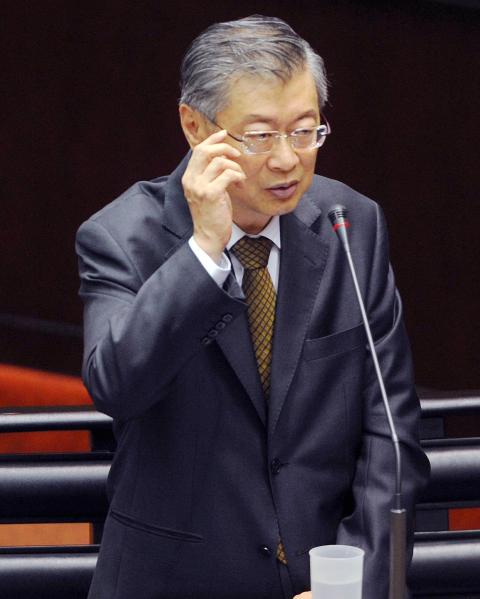Premier Sean Chen yesterday said that the possibility of an influx of foreign workers crowding out Aborigines was an issue that “demanded attention.”
Fielding questions from Chinese Nationalist Party (KMT) Legislator Jeng Tian-tsair (鄭天財), an Amis Aborigine, during a question-and-answer session in the legislature, Chen said the Cabinet would discuss how it can address the problem properly.
Jeng raised concern over the Cabinet’s plan to relax restrictions on the recruitment of foreign workers to attract new investors and encourage China-based Taiwanese businesspeople to relocate their businesses to the country.

Photo: Wang Yi-sung, Taipei Times
The government has estimated that the measures, which will take effect at the end of this year, for new investors who apply for investments in the next two years, would attract NT$200 billion (US$6.83billion) in investments, bringing in 80,000 foreign workers and creating 120,000 job opportunities for Taiwanese.
Jeng said that the policy would negatively affect Aboriginal employment.
“Between 2000 and the end of last year, there was an increase of 7,000 in the number of migrant workers. In the first eight months of the year, Taiwan recruited 12,000 extra workers from foreign countries. Now we will bring in an additional 80,000 foreign workers?” Jeng asked.
The incentives for investors would hit hard and fast on Aborigines, whose unemployment rate is already high, because about 30 percent of the Aborigines who are employed work either in the manufacturing or construction sectors, Jeng said.
Chen agreed with Jeng’s suggestion that companies may be required to provide employment opportunities for Aborigines to qualify for the investment incentives.
Separately, Independent Legislator May Chin (高金素梅) of the Atayal, KMT Legislator Kung Wen-chi (孔文吉) of the Sediq, and KMT Legislator Chien Tung-ming (簡東明) of the Paiwan urged Chen to speed up the drafting of an autonomy bill for Aborigines.
Chen said he has gone over the drafted bill initiated by the Council of Indigenous Peoples article by article, while talks between the council and local governments have been ongoing to review the feasibility of tribal self-governance projects as stipulated in the bill to make sure that the ideals of Aboriginal self-government can be realized.
“No one [in the Cabinet] is opposed to the idea of Aboriginal self-governance. We have been looking at how to implement the ideal idea,” Chen said.

The Ministry of Economic Affairs has fined Taobao NT$1.2 million (US$36,912) for advertisements that exceed its approved business scope, requiring the Chinese e-commerce platform to make corrections in the first half of this year or its license may be revoked. Lawmakers have called for stricter enforcement of Chinese e-commerce platforms and measures to prevent China from laundering its goods through Taiwan in response to US President Donald Trump’s heavy tariffs on China. The Legislative Yuan’s Finance Committee met today to discuss policies to prevent China from dumping goods in Taiwan, inviting government agencies to report. Democratic Progressive Party Legislator Kuo Kuo-wen (郭國文) said

The Ministry of Economic Affairs has fined Taobao NT$1.2 million (US$36,900) for advertisements that exceeded its approved business scope and ordered the Chinese e-commerce platform to make corrections in the first half of this year or its license would be revoked. Lawmakers have called for stricter supervision of Chinese e-commerce platforms and more stringent measures to prevent China from laundering its goods through Taiwan as US President Donald Trump’s administration cracks down on origin laundering. The legislature’s Finance Committee yesterday met to discuss policies to prevent China from dumping goods in Taiwan, inviting government agencies to report on the matter. Democratic Progressive Party

Taiwan and its Pacific ally Tuvalu on Tuesday signed two accords aimed at facilitating bilateral cooperation on labor affairs, according to Taiwan’s Ministry of Foreign Affairs (MOFA). The governments inked two agreements in Taipei, witnessed by Foreign Minister Lin Chia-lung (林佳龍) and visiting Deputy Tuvaluan Prime Minister Panapasi Nelesone, MOFA said in a news release. According to MOFA, the agreements will facilitate cooperation on labor issues and allow the two sides to mutually recognize seafarers’ certificates and related training. Taiwan would also continue to collaborate with Tuvalu across various fields to promote economic prosperity as well as the well-being of their

Sung Chien-liang (宋建樑), who led efforts to recall Democratic Progressive Party (DPP) Legislator Lee Kun-cheng (李坤城), was released on bail of NT$80,000 today amid outcry over his decision to wear a Nazi armband to questioning the night before. Sung arrived at the New Taipei District Prosecutors’ Office for questioning in a recall petition forgery case last night wearing a red armband bearing a swastika, carrying a copy of Adolf Hitler’s Mein Kampf and giving a Nazi salute. Sung left the building at 1:15am without the armband and covering the book with his coat. Lee said today that this is a serious